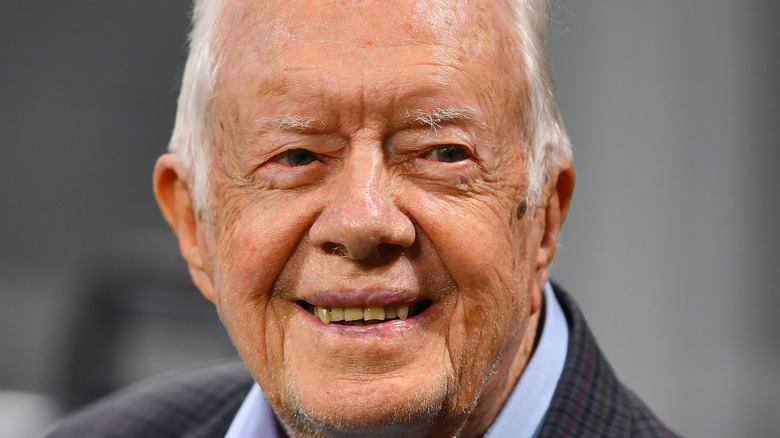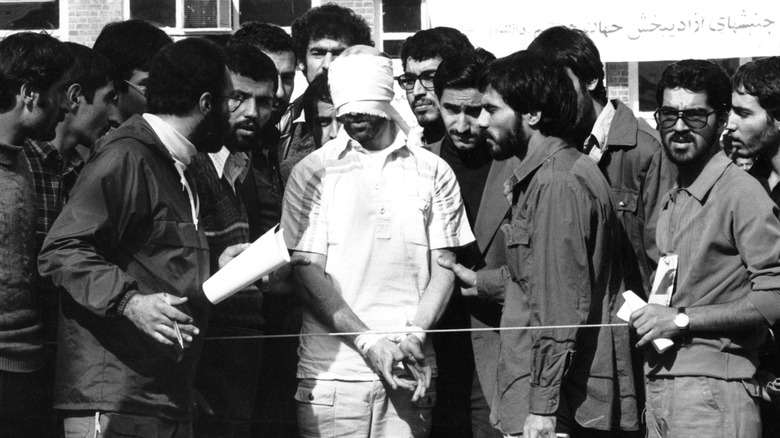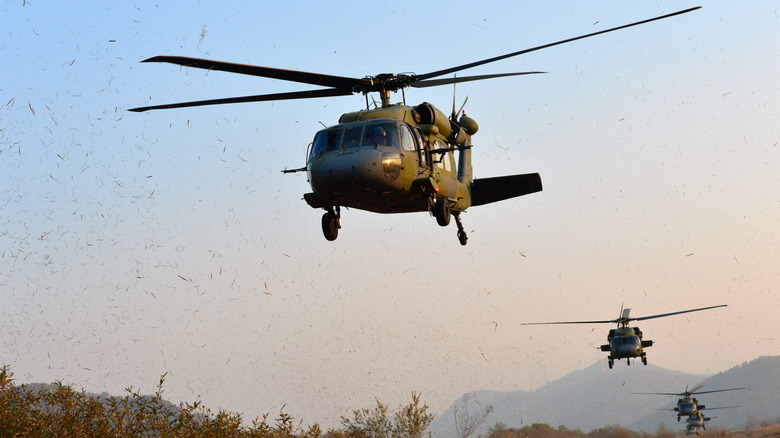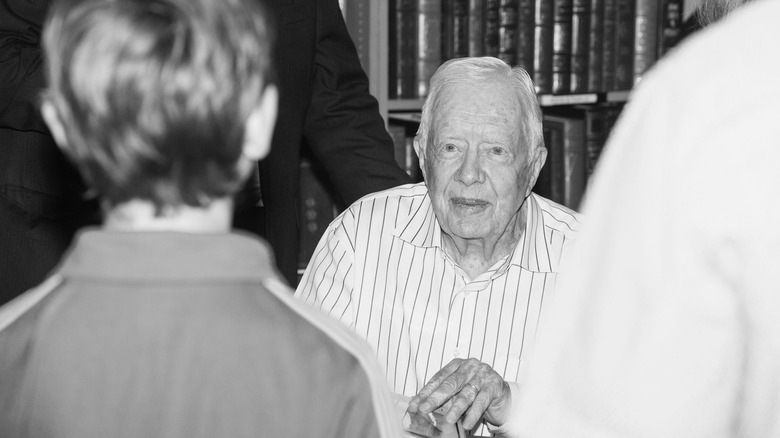Jimmy Carter's Biggest Regret As President May Surprise You
The presidency of Jimmy Carter was in many respects one of good intentions gone awry, as The New York Times describes. He came to be elected after Richard Nixon's infamous path to resignation and Gerald Ford's subsequent assumption of the office. For many, Carter represented a breath of fresh air. Indeed, he was an outsider disassociated from the recent corruption who would bring at least relative respectability back to the presidency. But Americans felt mixed about his initial performance and personal character, as he often did not seem to have solutions for the core issues he tried to tackle. And public opinion began to turn once the Iranian Revolution unfolded.
Not only was there the unprecedentedly massive hostage crisis, but as The Brookings Institution explains, global fuel prices soared as Iranian oil workers conducted strikes. It is arguably these economic factors that helped lead the American public in the opposite direction with the election of Ronald Reagan. In regards to Carter's own reflections on his presidency, his biggest regret has to do with his handling of the hostage crisis itself. Notably, he believes the rescue attempt could have been far less disastrous.
Carter wishes he invested more in Operation Eagle Claw
After decades of rule under Iran's American-backed shah — complete with democratically elected figures being ousted — various groups rose up in revolt during the Iranian Revolution. The American embassy in Tehran became the focal point of this anger, and the ensuing Iranian Hostage Crisis initially saw 66 Americans held captive before 13 were released. The remaining 53 were held for over a year as Jimmy Carter's administration tried to find a solution. They settled on Operation Eagle Claw, the planned military extraction of the hostages via helicopter, described on The Drive. The military would swoop in like an eagle with its talon open and ready to clutch and rescue.
The operation ended in complete failure after a series of mechanical and navigational issues led to a helicopter colliding with an EC-130E, killing eight service members, as Insider says. Several aircraft were abandoned, and no hostages were rescued in a disaster that Carter believes lost him the following election. Were he to do it over again, Carter has stated he would have deployed one more helicopter; three of the original eight deployed were grounded for maintenance, per CNN. This, from his perspective, could have made the difference and led to both a speedier resolution to the crisis and a greater chance of his reelection, as the Los Angeles Times discusses.
An unpredictable outcome
Even though President Carter states that one more helicopter would have made Operation Eagle Claw a success, it's impossible to know how one additional helicopter might have changed the outcome of the mission. Insider describes an incredibly complex collaboration between all four branches of the military and multiple U.S. special forces divisions on the day of the operation, an operation with so many moving parts that a whole host of things could have gone wrong. The Air Force provided aircraft, the Navy helicopters, the Marines pilots, and the Army special forces units like Rangers and Delta Force.
The operation was hampered right from the get-go by a civilian bus and fuel truck, the latter of which was destroyed because it didn't obey a command to stop. There were also mechanical problems with two of the RH-53 helicopters, and since a minimum of six helicopters was needed to pull the whole thing off, the mission got delayed. The next attempt saw more accidents on the parts of those involved, and an RH-53 helicopter collided with an EC-130E aircraft — hence Carter's statement that one more helicopter would have made a difference. Eight U.S. military personnel died, and eight vehicles were destroyed. Some called it a failure, others a "fiasco."
However, none of those occurrences could possibly fall on Carter's singular shoulders. That being said, the CIA did blame the former president for hampering the operation in other ways, because of executive decisions that limited intelligence gathering leeway.
Another, better chance
Even though President Carter regards the failure to rescue U.S. hostages during the Iran Hostage Crisis as his greatest failure, he also says that it allowed him to start his greatest and most helpful endeavor, The Carter Center. The Carter Center has been a major force since the 1980s in a wide variety of humanitarian ventures, most notably its Guinea Worm Eradication Program, Lymphatic Filariasis Elimination Program, River Blindness Elimination Program, and other not-widely-known health programs targeting not just disease mitigation, but disease elimination. The former president has also been involved in a plethora of diplomatic, human rights-based initiatives like the Human Rights Program, as well as work with Habitat for Humanity, the National Foundation for Infectious Diseases, and more. In 2002 he won the Nobel Peace Prize.
President Carter arguably wouldn't have had the chance to do any of things if he'd been elected president for a second term. Or at least, such ventures would have unfolded quite differently. As he says of his lost reelection on CNN, "That may have interfered with the foundation of the Carter Center, and if I had to choose between four more years, I think I would choose the Carter Center." Similarly, the failure of Operation Eagle Claw also led directly to the development of modern U.S. special forces, including Seal Team 6, as Insider describes.



